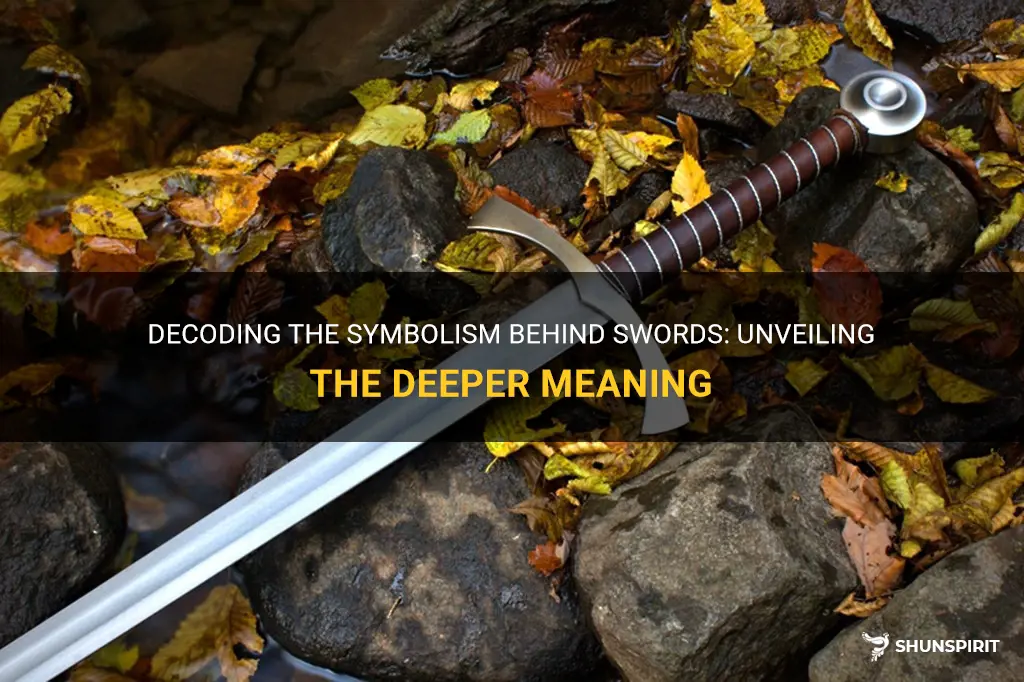
Sword symbol meaning holds great significance in various cultures and civilizations throughout history. It is often associated with power, courage, and strength. The sword has been revered as a symbol of authority and protector of justice. From the legendary Excalibur to the iconic samurai katanas, the sword symbolizes the triumph of good over evil and the quest for truth. Whether it is used in epic battles or as a ceremonial object, the sword remains an enduring symbol of honor, chivalry, and the indomitable spirit of humanity.
What You'll Learn
- What is the historical significance of the sword as a symbol?
- How has the meaning of the sword symbol evolved over time in different cultures?
- In mythology and folklore, what are some common associations or meanings associated with swords?
- What cultural or religious traditions feature the sword as a symbol and what does it represent in those contexts?
- How does the sword symbolize strength, power, or authority in various works of literature or art?

What is the historical significance of the sword as a symbol?
The sword is a weapon that has played a significant role throughout history. It has been used as a symbol of power, prestige, and warfare in various cultures and time periods. The historical significance of the sword as a symbol is evident in its use by warriors, knights, and rulers.
One of the earliest recorded uses of the sword as a symbol dates back to ancient Egypt. The pharaohs, who were considered divine rulers, were often depicted with a sheathed sword, signaling their authority and the power they held over their subjects. The sword was seen as a symbol of protection, justice, and the ability to defend oneself and the kingdom.
In ancient Greece, the sword took on a different significance. It became a symbol of honor and valor on the battlefield. The Greek hoplites, who were citizen-soldiers, used the sword called the xiphos as their primary weapon. This weapon was symbolic of their commitment to defend their city-states and their way of life. The sword also played an important role in Greek mythology, with legendary heroes like Achilles and Hercules wielding powerful swords in their quests.
In medieval Europe, the sword had a powerful symbolism as well. It became synonymous with knighthood and chivalry. The knights, who were the elite warriors of their time, were trained in the art of swordsmanship and were expected to uphold a code of conduct that included honor, loyalty, and bravery. The sword was seen as a representation of their noble status and their commitment to protect the weak and uphold justice. The most famous sword of this period is undoubtedly the Excalibur, the legendary sword of King Arthur, which symbolized the rightful rule of a true king.
The sword also played a crucial role in Japan's history, particularly during the feudal period. The samurai, the warrior class of Japan, were highly skilled in sword fighting and considered the sword as an extension of their own spirit. The samurai swords, known as katana, were not only weapons but also works of art. They were a symbol of the samurai's strength, discipline, and loyalty to their lord. The sword was even regarded as sacred, and samurai often took part in religious ceremonies where their swords were purified and revered.
In conclusion, the historical significance of the sword as a symbol cannot be understated. It has represented power, honor, and prestige in many different cultures and time periods. Whether used by Egyptian pharaohs, Greek hoplites, medieval knights, or Japanese samurai, the sword has always been a powerful symbol of authority, bravery, and the warrior's commitment to protect and defend. Its legacy continues to be seen in modern times, as the sword is still used as a symbol in military and heraldry, and as a metaphor for strength and courage.
Exploring the Symbolic Meanings behind Baby Brezza Symbols
You may want to see also

How has the meaning of the sword symbol evolved over time in different cultures?
The sword is a powerful symbol that has evolved over time in different cultures. It has been seen as a weapon of strength, honor, and authority. Throughout history, the meaning of the sword symbol has changed, and it has been associated with different aspects depending on the culture and era.
In ancient times, the sword was often associated with gods and mythical figures. In Greek and Roman mythology, for example, the sword was believed to be the weapon of choice for gods such as Zeus and Mars. It represented their authority and power over others. Similarly, in Norse mythology, the sword was associated with heroes and warriors. It was seen as a tool of protection and a symbol of their bravery and strength.
In medieval Europe, the sword took on a new meaning. It became a symbol of knighthood and chivalry. Knights would wield their swords in battle and use them to defend the weak and uphold justice. The sword was also seen as a status symbol, representing a knight's social standing and honor. It was often handed down through generations, further emphasizing its significance.
In Japanese culture, the sword, known as katana, played a pivotal role in shaping their history and values. The katana symbolized the samurai warrior class and their code of honor, known as Bushido. The sword was not only a weapon but also a representation of the samurai's soul. They believed that the sword embodied their spirit, and its preservation and care were of utmost importance.
In more recent times, the sword has taken on different meanings. In some cultures, it is seen as a symbol of rebellion and revolution. This can be seen in the use of swords by various groups and individuals during uprisings and revolutions throughout history. The sword has also been depicted in literature and film as a symbol of heroism and the fight against evil.
Overall, the meaning of the sword symbol has evolved over time in different cultures. It has represented strength, honor, authority, protection, and rebellion. From ancient gods to medieval knights and samurai warriors, the sword has played a significant role in shaping the history and values of various societies. Its symbolism continues to resonate today, reminding us of the power and significance associated with this timeless weapon.
Decoding Candy Washer Dryer Symbols: What Do They Mean?
You may want to see also

In mythology and folklore, what are some common associations or meanings associated with swords?
In mythology and folklore, swords often hold significant meaning and symbolism. They are frequently associated with power, heroism, and justice. From ancient legends to modern interpretations, the recurring themes and associations connected to swords have captivated people for centuries.
One common association is the idea of the sword as a weapon of power. In many myths, the sword represents physical strength and the ability to conquer one's enemies. The story of King Arthur and the sword Excalibur is a prime example of this. When Arthur pulls the sword from the stone, he becomes the rightful ruler of England, showcasing how the sword is a symbol of his power and legitimacy.
Swords are also often associated with heroism and the quest for justice. Many heroes in mythology and folklore wield swords as they embark on noble missions to save their people or fight against evil. The Greek hero Perseus used a sword to slay the Gorgon Medusa and save Andromeda. In the legend of Saint George and the Dragon, the saint uses his sword to defeat the monstrous creature and liberate the kingdom.
Furthermore, swords can symbolize the concept of courage and bravery. This is epitomized in the story of the sword in the stone, where only the most courageous and worthy knight can pull the sword from its resting place. The sword becomes a test of character and qualities such as honor, bravery, and integrity.
In some myths and folklore, swords possess magical or supernatural properties. These swords are often imbued with powers that aid the hero on their journey. The Norse god Odin possesses the sword Gram, which can cut through anything and is said to be able to cleave mountains. The sword's magical properties enhance the hero's abilities and make them almost invincible.
Contrarily, swords can also carry negative connotations, particularly when associated with betrayal or revenge. The story of Julius Caesar's assassination famously includes the line "Et tu, Brute?" meaning "You too, Brutus?" after being stabbed by a sword wielded by his close friend. In this context, the sword represents betrayal and the abuse of power.
In conclusion, swords in mythology and folklore embody a range of meanings and associations. They represent power, heroism, justice, and bravery in many stories, where they are wielded by courageous heroes in their quests. They can also possess magical properties and represent supernatural forces. However, swords can also symbolize betrayal and revenge, showcasing the duality and complex nature of these weapons in mythology and folklore.
Exploring the Rich Symbolism and Hidden Meanings of Armenian Culture
You may want to see also

What cultural or religious traditions feature the sword as a symbol and what does it represent in those contexts?
Throughout history, the sword has held great significance in various cultural and religious traditions. Its use as a symbol has often represented power, honor, and courage. Let's explore some of the notable instances where the sword plays a significant role.
In Japanese culture, the sword, known as "katana," holds a special place. It is not only a weapon but also a symbol of the samurai's identity. The samurai, Japan's ancient warrior class, considered their swords as an extension of their souls. The katana represented both martial prowess and personal honor. To possess a well-crafted sword was to possess a work of art and a testament to one's social status and skill.
In the context of Hindu mythology, the sword is associated with various deities and their attributes. Lord Shiva, for example, wields a trident in one hand and a sword in the other. The sword symbolizes his power to eliminate evil and ignorance. Similarly, the goddess Kali carries a sword, representing her ability to destroy evil forces. The sword serves as a tool for these deities to maintain cosmic order and righteousness.
In Christianity, the sword is often depicted in religious artwork, particularly in representations of Saint Michael the Archangel. Saint Michael is commonly depicted holding a sword, which symbolizes his role as the leader of heaven's armies and the vanquisher of evil. The sword serves as a representation of his strength and power in fighting against Satan and protecting the faithful.
Furthermore, in Sikhism, the sword holds an essential place as one of the Five Ks or articles of faith. Known as the "Kirpan," it is a ceremonial sword carried by devout Sikhs as a symbol of their commitment to justice, defense of the weak, and the struggle against tyranny. The Kirpan embodies the Sikh values of bravery and righteousness.
The sword is also a symbol of justice in various ancient European traditions. The Knights Templar, a medieval Christian military order, used the sword to symbolize their duty and commitment to protect pilgrims traveling to the Holy Land. The sword was a representation of their role as defenders of the faith and their readiness to fight in defense of Christian values.
In conclusion, the sword holds great cultural and religious significance in various traditions. From being a symbol of honor and courage in Japanese samurai culture to representing the power of deities in Hindu mythology, and from Saint Michael's vanquishing of evil in Christianity to the Sikh commitment to justice, the sword stands as a powerful metaphor throughout history. Its associations with strength, justice, and protection make it a potent symbol in many cultural and religious contexts.
Understanding the Symbolic Meaning of the Succubus
You may want to see also

How does the sword symbolize strength, power, or authority in various works of literature or art?
Throughout various works of literature and art, the sword has been consistently used as a symbol of strength, power, and authority. Whether it be in medieval tales of chivalry, epic fantasy novels, or even classical sculptures, the sword serves as a visual representation of these desirable qualities. Its presence often signifies the ability to conquer, protect, and command, making it a potent symbol within the realms of fiction and imagination.
In many medieval tales of chivalry, such as those featuring King Arthur and his Knights of the Round Table, the sword is a prominent symbol of authority. The sword Excalibur, which King Arthur pulls from the stone, becomes a symbol of his rightful rule and his ability to protect his kingdom. This legendary weapon represents not only strength and power, but also the responsibility that comes with leadership.
Similarly, in epic fantasy novels like J.R.R. Tolkien's "The Lord of the Rings," swords hold a significant role. The elven sword, Andúril, forged from the shards of the broken sword Narsil, signifies Aragorn's lineage and his claim to the throne of Gondor. Its restoration represents his rightful place as the true king and his ability to lead in the fight against evil.
In art, the sword is often depicted as a symbol of strength and power. Classical sculptures, like Michelangelo's statue of David, often depict the biblical hero wielding a sword. This choice of representation reinforces the idea of David's bravery and prowess in defeating the giant Goliath.
Moreover, the sword is also seen as a symbol of honor and courage. In Japanese culture, the katana is revered as a sacred weapon and is traditionally worn by samurai warriors. The sword represents the samurai's code of conduct, known as bushido, which emphasizes loyalty, honor, and self-discipline. It is a symbol of the warrior's strength and dedication to his lord.
Additionally, the sword can be a symbol of empowerment for marginalized communities. In the iconic novel "The Color Purple" by Alice Walker, the protagonist Celie finds strength and independence through her artistry in making pants and ultimately by wielding a symbolic sword. This sword represents her ability to stand up against oppression and reclaim her own power.
In conclusion, the sword symbolizes strength, power, and authority in various works of literature and art. Whether it be in tales of chivalry, epic fantasy novels, classical sculptures, or stories of empowerment, the sword represents the ability to conquer, protect, and command. Its presence serves as a visual representation of these desirable qualities and adds depth to the narrative or artwork.
Deciphering the Nissan Pathfinder Dashboard Symbols and Their Meanings
You may want to see also
Frequently asked questions
The sword symbol is often associated with power, strength, and courage. It can represent a sense of protection and defense, as well as the ability to conquer challenges and overcome obstacles.
The sword symbol has been used in various cultures and religions throughout history. It is commonly seen in Western folklore and mythology, often depicting knights and warriors. In Eastern cultures, the sword is often associated with martial arts and represents discipline and honor. The sword is also a prominent symbol in Christianity, representing the word of God and the spiritual battle against evil.
Yes, there are many different variations of the sword symbol. For example, a double-edged sword can symbolize balance and justice, while a flaming sword can represent divine power or enlightenment. The shape and design of the sword can also hold significance, such as a Celtic sword symbol with its distinctive hilt and blade shape. Overall, the meaning of the sword symbol can vary based on cultural, religious, and individual interpretations.







